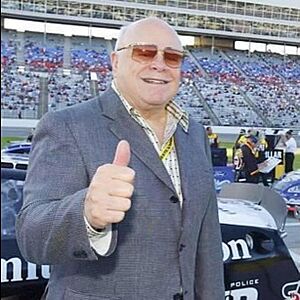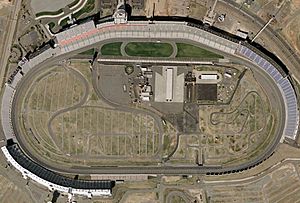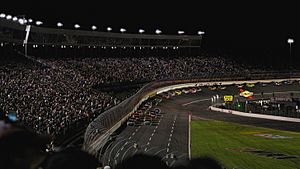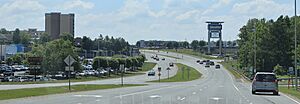Bruton Smith facts for kids
Quick facts for kids
Bruton Smith
|
|
|---|---|

Smith at Texas Motor Speedway in 2005
|
|
| Born |
Ollen Bruton Smith
March 3, 1927 Oakboro, North Carolina, U.S.
|
| Died | June 22, 2022 (aged 95) |
| Occupation | Racing promoter, race track owner, automobile dealer |
| Years active | 1949–2022 |
| Organization | Speedway Motorsports, Inc. Sonic Automotive |
| Spouse(s) |
Bonnie Jean Harris
(m. 1972; div. 1990) |
| Children | 5, including Marcus |
Ollen Bruton Smith (born March 3, 1927 – died June 22, 2022) was an American businessman. He was a very important person in the world of motorsports. Smith was known for owning two big companies: Speedway Motorsports, Inc. (SMI) and Sonic Automotive. He was the chief executive officer (CEO) of both companies.
Smith was an entrepreneur, which means he started his own businesses. He was also a race promoter and a businessman during the time when stock car racing became very popular in the 1950s.
Smith grew up near Oakboro, North Carolina. In 1959, he teamed up with race car driver Curtis Turner. They built the Charlotte Motor Speedway, a large racetrack in Concord, North Carolina. After some early problems, Smith faced financial difficulties. He then focused on selling cars. His car dealership business became very successful.
Later, Smith bought back parts of the Charlotte Motor Speedway. He became its general manager in 1975. In the 1990s and 2000s, he bought many more racetracks. He used money from taking SMI public on the New York Stock Exchange in 1995. Two years later, he started Sonic Automotive, a chain of car dealerships. He became CEO of both SMI and Sonic Automotive.
Many people see Smith as one of the most important businessmen in auto racing. He was known for spending money to make his racetracks amazing. He also built Sonic Automotive into one of the biggest car dealership businesses in the United States. Smith was also part of a big rivalry between his company, SMI, and NASCAR's own company, the International Speedway Corporation (ISC). This rivalry started in the late 1940s.
Contents
Bruton Smith's Early Life
Smith was born in Oakboro, North Carolina, on March 3, 1927. He was the youngest of nine children. His family lived on a farm outside Oakboro.
Life on the farm meant his family had a home and food. But they did not have much money. Smith did not like this and decided he would leave the farm by age nine. When he was 11, he dreamed of becoming a boxing champion. He practiced boxing for five years. Smith also had "crazy ideas" as a child, like wanting to own a train or a trucking company.
Smith first saw a car race when he was eight years old. It was at the Charlotte Speedway. In 1946, Smith started selling used cars from his front yard. He ran this business for about five years.
After finishing Oakboro High School in 1944, he worked in a hosiery mill. At 17, he bought his first race car for $700. He once claimed he beat famous NASCAR drivers Buck Baker and Joe Weatherly. However, Smith's mother did not want him to race. She prayed he would stop. Smith said he could not "fight [his] mom and God", so he stopped racing.
Bruton Smith's Business Career
Starting Out in Racing
Early Racing Groups and Rivalries
Smith began promoting stock-car races when he was 17. He held events in a cornfield in Midland, North Carolina, which he called the "Dust Bowl". In 1949, Smith took over the National Stock Car Racing Association (NSCRA). This group was a competitor to NASCAR, which also started in 1948.
Smith announced a new type of race called "Strictly Stock." These races used newer model cars. In response, NASCAR's president, Bill France Sr., created his own "Strictly Stock" division. He held their first race on the same day Smith planned his. Many people see this as the start of a rivalry between the Smith family and the France family. This rivalry grew with Speedway Motorsports (Smith's company) and the International Speedway Corporation (France Sr.'s company).
In 1951, Smith took over the Charlotte Speedway to promote races there. That same year, France and Smith talked about joining their racing groups. They almost agreed. But Smith was drafted into the United States Army in January 1951 to fight in the Korean War. He became a paratrooper. When Smith returned two years later, his racing group, the NSCRA, had fallen apart.
Promoting Races After the War
After leaving the Army in 1953, Smith returned home. He lived with his mother in Concord, North Carolina. For most of the 1950s, he sold cars. He also promoted local short-track races in the Carolinas.
Smith helped make stock-car racing more professional. He even made drivers take publicity photos wearing suits and ties. Smith was also known for getting into arguments with drivers. By 1955, he earned a lot of money from promoting races.
Charlotte Motor Speedway and Challenges
By the late 1950s, stock-car racing was very popular in the Southeast. New racetracks were being built. Smith teamed up with businessman John William Propst Jr. to build a $2 million racetrack. At the same time, race car driver Curtis Turner also wanted to build a speedway.
In 1958, Smith's deal with Propst fell apart. Smith then called Turner to work together. After some talks, Turner refused to partner with Smith. Smith felt betrayed. He knew Charlotte could only support one speedway. So, Smith announced he would build a new speedway to compete with Turner's idea.
Smith knew Turner did not have enough money to build his own speedway. Turner also struggled to sell shares for his track. Smith promised to sell 100,000 shares himself. He also became the vice president of the speedway. Construction on the speedway began in the summer of 1959. It was finished in mid-June 1960, just in time for the 1960 World 600 race.
The track had many problems during its first race. Facilities were not complete, and the track surface was poor. There were also money problems. Many people who worked on the track were not paid. Smith later said it was "a miracle that the place got built." He admitted he lost over $150,000 building the track.
In 1961, a contractor forced the speedway into bankruptcy court. The track owed a lot of money. Smith and Turner were removed from the speedway's board of directors. Smith was later made the promotional director.
In 1962, Smith was charged with not filing tax returns correctly. He was found guilty and had to pay a fine. He also received a suspended prison term. Because he was removed from the board and faced legal issues, he left the speedway. Two years later, his name was put forward to rejoin the board. But people booed and protested the idea.
Becoming a Car Dealer and Returning to Charlotte
After not being able to rejoin the speedway's board, Smith decided to follow another dream. He wanted to own a new-car dealership. In 1966, he started as a salesman at a Ford dealership. He then moved to Colorado to run another Ford dealership.
In 1968, Ford sold Smith a dealership in Rockford, Illinois. Smith became very successful there. He was known as a wealthy dealer. His business grew, and he became president of the Rockford New Car Dealers Association. Ford then offered him a chance to open a new dealership in Houston, Texas. By March 1980, he had ten dealerships. He decided to sell or close all but two locations in Houston and Charlotte. He said he realized he was "really working for my employees," and he no longer wanted to do that.
In the mid-1970s, Smith's car dealerships were doing very well. He started buying more shares in the Charlotte Motor Speedway. By February 1974, he owned enough stock to become chairman of the board of directors. He replaced Richard Howard.
By February 1975, Howard wanted to resign. Both Howard and Smith accused each other of problems. Smith felt Howard had too much control. By July, Smith bought more shares from Howard's family. Three months later, Smith owned almost 800,000 shares. He planned to become the main owner.
Rumors spread that Howard would step down as president. Howard felt his job was at risk when H. A. "Humpy" Wheeler was hired. Howard wanted to spend money carefully on the track. Smith, however, was a rich businessman who wanted to make the track a world-class facility. On October 5, 1975, it was reported that the 1975 National 500 would be Howard's last race at the speedway. On January 30, 1976, Howard officially stepped down. Humpy Wheeler took his place. This completed Smith's takeover of the speedway.
New Businesses and Speedway Motorsports
In the late 1970s and early 1980s, Smith bought shares in many companies. In 1977, Smith bought a private jet from Ugandan leader Idi Amin. In June 1979, Smith started Sonic Aviation, a company that offered private jet services.
In 1985, Smith bought all the remaining shares in the Charlotte Motor Speedway. This made him the only owner of the track. Smith started buying more racetracks in the 1990s. He bought the Atlanta International Raceway in 1990 for $19.8 million. He said he would add more seats and improve other parts of the track.
Smith also made improvements to Charlotte Motor Speedway. He added lights in April 1992 so races could be held at night. Many people came to see the first night practice sessions. Smith also created a new type of short-track racing called Legends Car. He felt the Charlotte Motor Speedway needed to lower costs for local, entry-level racing.
Smith then created Speedway Motorsports, Inc. (SMI) in 1994. He offered shares to the public in 1995. The stock price of SMI grew quickly. Smith used the money from the company's stock to build a new track, the Texas Motor Speedway. He also bought the North Wilkesboro Speedway in 1995 with businessman Bob Bahre. Later, Smith bought the Bristol International Raceway and the Sears Point Raceway in 1996. He bought the Las Vegas Motor Speedway in 1998.
Sonic Automotive
In February 1997, Smith started Sonic Automotive, a car dealership business. In August of that year, Smith decided to offer shares of the company to the public on the New York Stock Exchange. He hoped to raise $104 million. At that time, Sonic Automotive had 20 dealerships.
The company grew steadily throughout the late 1990s and 2000s. It became a Fortune 500 company in 2000, meaning it was one of the largest companies in the United States.
Later Business Ventures
Smith continued to buy speedways in the 2000s. He bought the New Hampshire International Speedway and the Kentucky Speedway in 2008. He also gained full control of the North Wilkesboro Speedway from Bob Bahre in 2007.
In 2019, Smith made Speedway Motorsports a private company again. This meant it was no longer traded on the New York Stock Exchange. According to Hendrick Motorsports' owner Rick Hendrick, Smith was still actively working as a businessman until he passed away.
Bruton Smith's Personal Life
Family Life
Smith married Bonnie Jean Harris on June 6, 1972. They met in 1969 when he sold her a car. Bruton and Bonnie had five children together: Anna Lisa, Bruton Jr., David, Marcus, and Scott. Four of their children were still living when their father died. Bruton Smith Jr. died when he was seven months old in 1980.
After Bruton Smith Jr.'s death, the marriage became difficult. Bonnie filed for divorce in July 1988. In November of that year, Bruton agreed to pay child support and money for a new home for Bonnie.
In 1990, a trial was held to decide how their shared property would be divided. On April 6, 1991, it was reported that their property was worth $51.3 million. Bruton was ordered to pay $21 million to Bonnie. This was the largest divorce payment in North Carolina history at the time. Bruton later tried to lower the amount. After many court hearings, Bruton agreed to pay a settlement of $19.4 million in 1994. This included paying Bonnie's lawyers. He finished paying the lawyer fees in 2001.
Helping Children
Smith started Speedway Children's Charities in 1982. He did this after his son, Bruton Smith Jr., died in 1980. As of June 2022, this charity had given more than $61 million to help children.
Passing Away
In June 2015, Smith was diagnosed with a type of cancer called non-Hodgkin's lymphoma. He had surgery that summer, and it was successful.
Bruton Smith passed away on June 22, 2022, in Charlotte, North Carolina. He was 95 years old. A public funeral service was held on June 30.
Bruton Smith's Legacy and Honors
Smith is seen as one of the most important businessmen in both auto racing and car sales. Humpy Wheeler, who used to be president of Charlotte Motor Speedway, said Smith was "a force to be reckoned with." He added that Smith got what he wanted through hard work. Former Texas Motor Speedway president Eddie Gossage called Smith "the greatest boss ever." He said Smith turned many racetracks into world-class places. Chris Powell, the current president of the Las Vegas Motor Speedway, praised Smith's work ethic. He called him a "visionary" who loved to work every day.
The SMI and ISC Rivalry

Smith's rivalry with the France family led to tension between their companies, Speedway Motorsports (SMI) and the International Speedway Corporation (ISC). These two companies competed for race dates. There were even lawsuits between them, like the Ferko lawsuit. This lawsuit led to many changes in NASCAR's race schedule. Before the lawsuit was settled, Smith wanted a second NASCAR Cup Series race at Texas Motor Speedway. There were rumors that Smith might even start his own racing series if he didn't get what he wanted.
However, by 2016, Smith was elected into the NASCAR Hall of Fame. His partner in creating Charlotte Motor Speedway, Curtis Turner, was also elected. This was seen as a sign that the two families were starting to get along better.
Awards and Recognition
- Smith was inducted into the North Carolina Business Hall of Fame in 2006.
- He was inducted into the Stock Car Racing Hall of Fame in 2006.
- In 2008, the city of Concord renamed Speedway Boulevard to "Bruton Smith Boulevard."
- He was inducted into the International Motorsports Hall of Fame in 2007.
- Smith was inducted into the NASCAR Hall of Fame on January 23, 2016.
See also
- Speedway Motorsports
- Speedway Children's Charities
- Sonic Automotive
 | Dorothy Vaughan |
 | Charles Henry Turner |
 | Hildrus Poindexter |
 | Henry Cecil McBay |




